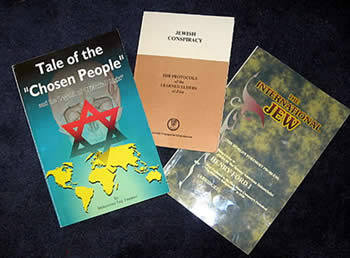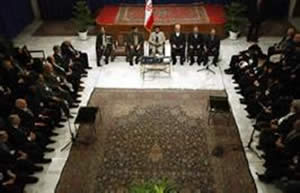The Iranian Vice President's Anti-Semitic Speech
1. On June 26, 2012, Iranian Vice President Mohammad-Reza Rahimi gave a blatant, openly anti-Semitic speech at an international anti-drug conference held in Tehran and sponsored by the UN. The conference was held on the occasion of the International Day of Drug Abuse, and at least ten Western diplomats from Europe and the UN were present at the time (Reuters).
2. The main points of the speech were the following:[1]
1) Zionists control the global drug trade. That is because the Talmud teaches the Jews to think they are a superior race and shows them how to destroy non-Jews.
2) As "proof," Mohammad-Reza Rahimi said thatno Zionist was addicted to drugs. He said Iran would pay anyone who could find a single Zionist addict.
3) The Bolshevik Revolution of 1917 was initiated by the Jews. In addition, the vice president also mentioned gynecologists who killed black babies on the orders of the Zionists.
Manifestations of Iran's Anti-Semitic Policy
3. The speech given by the Iranian vice president was a manifestation of Iran's overall anti-Semitic policy. Iran is the only country in the world since the Second World War to make intensive use of anti-Semitism integrated into an overt, deliberate policy of genocide planned and aimed to destroy Israel as the Jewish homeland. Other manifestations of Iranian policy include: anti-Semitic remarks made by senior figures in the Iranian regime (in which the word "Zionists" sometimes means Jews in general);leading the Holocaust denial campaign or minimizing the Holocaust; distributing The Protocols of the Elders of Zion and other anti-Semitic works throughout the Middle East and around the globe; making frequent anti-Semitic remarks in Iranian publications, on television, over the Internet, in movies and in the press. The Ahmadinejad regime has escalated the implementation of Iran's anti-Semitic policy.
4. Islamic institutions in Iran publish books with anti-Semitic content, especially The Protocols of the Elders of Zion, which has been issued in many editions. The first was in the summer of 1978 before the Islamic Revolution, as a way of attacking the Shah, Israel and the Jews. In 1985 a new edition of the The Protocols was printed and widely distributed by the Islamic Propagation Organization, International Relations Department, in Tehran. The Astan Quds Razavi Foundation financed publications of The Protocols in 1994, and parts of it were quoted in the Iranian media. The edition published by Iran's Islamic Propaganda Organization was exhibited at the Iranian pavilion at the book fair in Frankfurt in 2005. Another version of The Protocols was translated from Arabic into Farsi by Hamid Reza Shikhi and published by the Islamic Research Foundation under the titled The Protocols of the Elders of Zion: World Zionism's Blueprint. A third edition of Shikhi's book was published in Iran in 2005-2006 and can be found in Iran's national library (catalogue card number 1062209).

A selection of anti-Semitic books available at the Iranian pavilion at the Frankfurt Book Fair in 2005 (Photo from the zombietime.com website)
5. The Iranian vice-president's claims that the Jews (or "Zionists," his term of preference) control the global drug trade and started the Bolshevik revolution, are the result ofProtocolsmyths prevalent in Iran. They are based on the myth that the Jews want to dominate the world and have been behind all the revolutions, wars and ills plaguing humanity. The concepts are well-rooted in the mentality of the rulers of the Iranian regime, who contend that the Jews are either overtly or covertly involved in every international event or crisis, that they control the global media (especially the film industry and particularly in America), that they founded the Freemasons[2] to implement their plots to dominate the world and prevent the spread of Islam, that they exert pressure on the decision-makers in the United States and Europe and support terrorist groups around the world to manufacture crises. Thus, according to their twisted logic, the Jews/Zionists are a threat and danger to world peace.[3]
Roots and Objectives of Iran's Anti-Semitic Policy
6. The ideologically and religiously, Iran's anti-Semitic policy is rooted in Khomeini's Islamic Revolution (1979)and Shi'ite religious law, which follow the Qur'an and define the Jews as infidels and impure. Khomeini regarded the Jews as the enemies of Islam from its inception to the present time. The negative image of the Jews held by Khomeini and the heads of the Iranian Islamic regime was sharpened because they identified the Jews and "world Zionism" asallies of the Shah, deposed by the Islamic Revolution, and were considered to have robbed the Palestinians of their rights and land. The Palestinian cause is one of the foundations, internal and external, on which the new Islamic regime in Iran based itself and justifies its negative stance toward the Jews, Israel and the entire Middle East peace process.
7. However, the Iran's anti-Semitic policy is not only a function of The Protocols of the Elders of Zion, of the ideological and religious outlook of the leaders of the regime or the deep-seated hatred of the Jews in Iranian society. It is also a manifestation of a planned, logical strategy by means of which the Iranian regime seeks to attain three main objectives:[4]
1) The Iranian regime regards anti-Semitism as an effective tool to advance Iran's desire to attain regional hegemony and strengthen its position in the Arab-Muslim world. As opposed to the first years of the Islamic regime in Tehran, today Iran is engaged in a campaign to increase its influence in the Middle East. The Iranian regime considers its anti-Israeli, anti-Semitic campaign as an effective propaganda weapon which can be used to acquire support among the Arab-Muslim masses and to harm the pro-Western regimes which have peace treaties with Israel, exploiting the hatred for Israel, the Jews and the West prevalent in the Arab-Muslim world. Using anti-Semitism and anti-Israeli sentiments for such purposes is not new; they have always been effectively exploited by the Arab regimes in the Middle East to enlist popular support. The Arab regimes, however, have not turned anti-Semitism into a formal political-strategic tool the way Iran has.
2) The Iranian regime seeks to increase its influence among the Palestinians and represents itself as the standard-bearer of their struggle to regain their "rights." The heads of the Iranian regime represent the Palestinians as the real victims of the Holocaust and of the implementation of The Protocols of the Elders of Zion by Israel and the Zionist Movement. That enables them to wage an anti-Semitic, anti-Israeli campaign and to represent themselves to the Arab world and the Palestinians as defending Palestinian rights and promoting their goal of the destruction of the State of Israel. The anti-Israeli campaign accompanies an anti-Semitic campaign side by side with support for Palestinian terrorism and strengthening ties with Hamas, which which also uses the "weapon of anti-Semitism."[5]

Iranian Vice President Mohammad-Reza Rahimi (right) with Ismail Haniya, head of the de-facto Hamas administration in the Gaza Strip (Photo from the islamtimes.org website, February 11, 2012)
3) Iran regards Holocaust denial as a means to delegitimize the Zionist Movement and the State of Israel to pave the way, ideologically and morally, for its destruction. Holocaust denial is an integral part of Iran's anti-Semitic policy. For the Iranians, denying the Holocaust or minimizing its extent will subvert the European and American guilt feelings which led to the establishment of the State of Israel, and thus prepare the ground for its destruction. The so-called "Jewish problem," as far as the Iranian regime is concerned, is essentially a European problem which has to be resolved in Europe by letting the Jews live there and their protegées. However, the Islamic Palestinian state will be established on the ruins of the State of Israel.

The international Holocaust denial conference held in Tehran on December 11 and 12, 2006. Ahmadinejad sits in the center (Photo by Rahib Homvandi for Reuters, December 12, 2006). Sixty-seven participants from 30 countries attended the conference, among them several notorious Holocaust deniers. The conference agenda included discussions on whether or not there was a Holocaust, how extensive it was, how many Jews were killed, were there gas chambers or not, how it influenced Zionism, etc.
8. Note: The Iranian positions on Judaism and the Holocaust are not monolithic. There are those in Tehran who express themselves more moderately and are careful in what they say in an attempt to undo some of the damage done by Ahmadinejad's rhetoric. However, the silence of the heads of the Iranian regime is an expression of support for the country's blatantly aggressive stance towards Israel, the Jews and Western culture, and there is no way to be certain that it will remain within the realms of rhetoric.
[1]ISNA, The New York Times, FARS News Agency, June 26, 2012.
[2]The Jews are accused of links to the Freemasons because the order is secret and thought by the Iranians to be subversive. Anti-Semites tend to link the Freemasons and "world Zionism" as a foundation for the claim that the Jews want to dominate the world, despite the fact that Freemasons are not necessarily Jews, but count as members men of many religions.
[3]For further information and similar statements, see the January 20, 2010 bulletin "In a speech given to the Revolutionary Guards, Ayatollah Mesbah-Yazdi, Ahmadinejad’s spiritual mentor, accused the Jews and the Zionist of corruption and fanning resistance against the regime as part of their effort to “take over the world and destroy Islam."
[4]For further information and an analysis of Iran's anti-Semitic policies, see the April 22, 2008 bulletin "Contemporary Arab-Muslim anti-Semitism, its Significance and Implications (Updated to March 2008)."
[5]Remarks made by senior Hamas figures and statements in the Hamas media often contain anti-Semitism. The 1988 Hamas Charter is rife with blatant, vicious anti-Semitism which shows both Islamic and "classic" European roots. The anti-Semitic myths based on The Protocols(mentioned in Article 32 of the charter) refer to the Jewish control of global media, movies and education. The charter also makes the familiar claims (also present in the Iranian vice president's speech) that the Jews have been behind most of the revolutions in the world, including the Communist and French revolutions, the World Wars and local wars.










